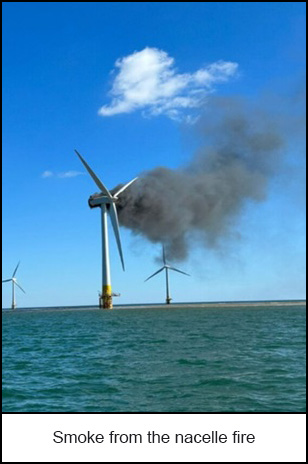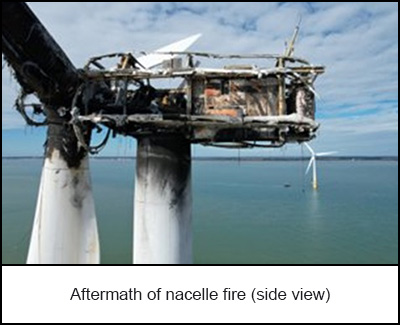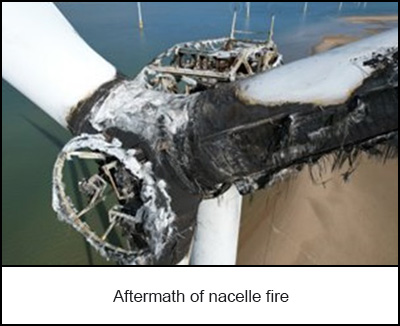-
What happened?
A triple major component exchange consisting of gearbox, generator and transformer was underway at the site.
During the return to service of the wind turbine generator (WTG) the high voltage (HV) transformer was to be energised.
Immediately upon re-energisation of the transformer, noises were heard from the nacelle and smoke was seen shortly afterwards.
A team of five technicians, who were all situated on the transition piece (TP) for re-energisation evacuated quickly to the vessel, sustaining no injuries.
The affected WTG was de-energised then proceeded to burn for approximately three and a half hours before self-extinguishing.
Emergency response procedures (ERPs) were enacted with immediate incident mitigations taken.

-
Why did it happen?
The most likely root cause was determined to be the temporary generator remaining connected during re-energisation of the WTG.

-
What did they learn?
Ensure that temporary electrical supplies are disconnected from the WTG auxiliary system prior to energisation.
When energised equipment is operated, the primary method of safety of persons undertaking the switching operation should be to design out the risks associated with the switching operation to as low as reasonably practicable (ALARP).
Ensure that installed system protection schemes and devices designed to protect the energised equipment are confirmed as healthy and operational to mitigate any potential disruptive failure prior to first energisation.
Consider the location of the vessel during first energisation of energised equipment following commissioning of a new system, a programme of maintenance or fault rectification.
Sites should conduct emergency exercises to gauge response from all stakeholders in order to identify any improvement opportunities.

-
Ask yourself or your crew
How can something like this happen here?
How can we improve the way we do this task?
Do we have the sufficient controls in place to avoid an incident like this?
What would we do in this situation?

Add to homescreen
Content name
Select existing category:
Content name
New collection
Edit collection
What happened?
A triple major component exchange consisting of gearbox, generator and transformer was underway at the site.
During the return to service of the wind turbine generator (WTG) the high voltage (HV) transformer was to be energised.
Immediately upon re-energisation of the transformer, noises were heard from the nacelle and smoke was seen shortly afterwards.
A team of five technicians, who were all situated on the transition piece (TP) for re-energisation evacuated quickly to the vessel, sustaining no injuries.
The affected WTG was de-energised then proceeded to burn for approximately three and a half hours before self-extinguishing.
Emergency response procedures (ERPs) were enacted with immediate incident mitigations taken.

Why did it happen?
The most likely root cause was determined to be the temporary generator remaining connected during re-energisation of the WTG.

What did they learn?
Ensure that temporary electrical supplies are disconnected from the WTG auxiliary system prior to energisation.
When energised equipment is operated, the primary method of safety of persons undertaking the switching operation should be to design out the risks associated with the switching operation to as low as reasonably practicable (ALARP).
Ensure that installed system protection schemes and devices designed to protect the energised equipment are confirmed as healthy and operational to mitigate any potential disruptive failure prior to first energisation.
Consider the location of the vessel during first energisation of energised equipment following commissioning of a new system, a programme of maintenance or fault rectification.
Sites should conduct emergency exercises to gauge response from all stakeholders in order to identify any improvement opportunities.

Ask yourself or your crew
How can something like this happen here?
How can we improve the way we do this task?
Do we have the sufficient controls in place to avoid an incident like this?
What would we do in this situation?
During the return to service of the wind turbine generator, the high voltage transformer was to be energised. Upon re-energisation of the transformer, noises were heard from the nacelle and smoke was seen.












